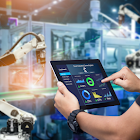Artificial Intelligence (AI): Empowering the Future with Intelligent Machines
Introduction:
Artificial Intelligence (AI) has emerged as a groundbreaking technology that is reshaping industries and transforming the way we live and work. With its ability to simulate human intelligence and perform complex tasks, AI is revolutionizing various sectors, from healthcare and finance to transportation and education. This article delves into the concept of AI, its applications, and the potential it holds for the future.
1. Understanding AI:
AI refers to the development of computer systems that can perform tasks that typically require human intelligence. It encompasses a wide range of technologies, including machine learning, natural language processing, computer vision, and robotics. AI systems learn from data, adapt to new information, and make intelligent decisions based on patterns and algorithms.
2. AI Applications:
AI is being applied across diverse industries, driving innovation and improving efficiency. In healthcare, AI is used for medical image analysis, disease diagnosis, and drug discovery. In finance, AI algorithms enable fraud detection, risk assessment, and personalized financial advice. AI-powered virtual assistants and chatbots enhance customer service and support in various sectors. Additionally, AI is revolutionizing transportation through self-driving cars and optimizing traffic management systems.
3. Machine Learning:
Machine learning, a subset of AI, focuses on enabling computers to learn from data and improve their performance without being explicitly programmed. Through algorithms and statistical models, machines can recognize patterns, make predictions, and continuously refine their understanding. Machine learning is at the core of many AI applications, allowing systems to adapt and evolve based on real-world data.
4. Ethical Considerations:
As AI becomes more pervasive, ethical considerations come to the forefront. Issues such as bias in algorithms, privacy concerns, and job displacement need to be addressed. Ensuring transparency, fairness, and accountability in AI systems is crucial. Striking the right balance between innovation and ethical responsibility is essential to harness the full potential of AI for the benefit of society.
5. The Future of AI:
The future of AI holds immense promise. AI is expected to drive further advancements in healthcare, with personalized medicine and improved patient outcomes. In education, AI can enhance personalized learning experiences and provide intelligent tutoring. AI-powered smart cities can optimize energy consumption, transportation, and urban planning. The potential for AI to revolutionize agriculture, climate change mitigation, and space exploration is also being explored.
Conclusion:
Artificial Intelligence is a transformative technology that is reshaping industries and empowering the future. From healthcare and finance to transportation and education, AI is revolutionizing the way we live and work. However, ethical considerations and responsible development are crucial to ensure that AI benefits society as a whole. By embracing AI’s potential while addressing its challenges, we can unlock a future where intelligent machines augment human capabilities and lead to unprecedented advancements in various domains.
Shadi Mouhriz




